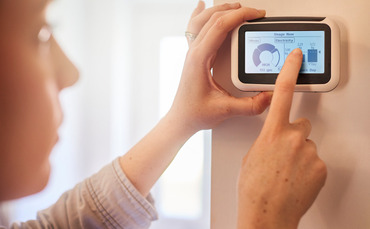‘Smarter, greener lives’: Five-year plan aims to boost smart meter innovation

Smart DCC, the company which runs the UK’s smart meter infrastructure, has today unveiled a five-year plan to better support the UK’s shift to smart grids and electric vehicles through smart meter technology, while also easing the process of switching between domestic energy suppliers.
Setting out Smart DCC’s purpose to “make Britain more connected so that everyone can lead smarter, greener lives”, the Business and Development Plan promises to deliver a host of improvements for smart meter users, energy suppliers and distribution network operators.
These include proposals to boost innovation in energy networks by enabling data to be gathered safely from smart meters. This will help support the shift to EVs, smart grids and other low carbon technologies, it said.
And, to aid smart meter research and development, Smart DCC plans to soon open its new test lab facility in Manchester, which will feature areas to work with customers on future innovation.
Smart DCC also plans to improve connections for smart meters in blocks of flats or homes with thicker walls, and the enrolment of first-generation meters onto Smart DCC’s centralised network in order to tackle the issue of meters losing functionality when consumers switch energy supplier.
The firm – otherwise known as the Data Communications Company – said its aim was to deliver faster and more reliable switching services to help energy consumers switch seamlessly switch supplier within one working day.
But Smart DCC, which is owned by outsourcing giant Capita, stressed that the rollout of smart meters was still its “immediate priority”, and stressed that installations were now occurring at a rate of 20 every minute, every day.
It comes as the UK faces a race against time to hit its own target of offering every home and business a smart meter by the end of 2020, in a project estimated to cost over £11bn in total.
“Delivering the smart meter roll-out remains our commitment and the number one priority for the passionate, hard-working team in the DCC and its contractors and service providers,” insisted Smart DCC’s chairman Richard McCarthy. “Together we are digitising Britain’s analogue energy network and making a critical contribution to decarbonisation in the UK.”
Advocates of smart meters argue they are key to helping consumers and business better manage their energy use, which can save money on bills as well as boost energy productivity in order to help reduce greenhouse gas emissions. The technology also opens up potential business opportunities from using energy data to digitally connect green technologies such as battery storage and EVs.
However, to date only between 12 and 13 million smart meters have been installed in the UK. That leaves just under 40 million to be fitted before the end of next year, which the National Audit Office has said will prove an almost impossible target.
Earlier this year the government unveiled new proposals to promote the technology to small businesses and other non-domestic sites in a bid to get the smart meter rollout back on track.
But Smart DCC CEO Angus Flett claimed the company had “made some impressive progress” over the past year, having delivered 1.6 million second-generation smart meters.
“This five-year plan sets out how working with our customers we will bring cost savings and innovation to this platform for good,” he added. “This work reaffirms the DCC’s purpose of making Britain more connected so we can all live smarter, greener lives.”
